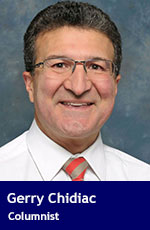Embracing our liability for historical wrongs is essential to finding meaning and happiness in life
 One of the greatest writers on the meaning of human existence is the psychiatrist Viktor Frankl. His theories were galvanized as he battled between life and death every day in Nazi concentration camps. Ultimately, he chose to say yes to life and miraculously survived the ordeal.
One of the greatest writers on the meaning of human existence is the psychiatrist Viktor Frankl. His theories were galvanized as he battled between life and death every day in Nazi concentration camps. Ultimately, he chose to say yes to life and miraculously survived the ordeal.
Frankl discovered that understanding the difference between guilt and liability is key to finding happiness and meaning in life. For example, if we get sick, it is not a question of fault; we make changes to ensure the most complete recovery possible. Taking on such obstacles can be a tremendous source of self-realization and joy.
We live in a very sick world. People have done great damage to one another and to the planet we live on. Most of us were not yet born when much of the damage occurred or when the institutions doing the damage were established. We are not guilty, but we are liable in the recovery process, and it is in accepting responsibility for restoring health that we find our greatest happiness and meaning in life.
 Photo by Social History Archive |
| Related Stories |
| Slavery is not just a black and white issue
|
| We can’t hide our heads in the sand over racism
|
| How British imperialists ended slavery
|
This is ultimately why I find my work as an educator so fulfilling. My German grandfather was not a leader in the Nazi regime, but he was an early party member and likely voted for them. I am certain he regretted doing so, and I am not responsible for decisions my grandfather made 90 years ago.
My responsibility is to learn from his mistakes and make reparations. I honour my grandfather by intentionally living each day doing all that I can to ensure that the lies espoused by the Nazi party are challenged. In doing so, I promote respect for all human beings, honour freedom of the press and academic freedom, encourage critical thinking, and treat each person I meet with dignity.
I am not alone in this way of thinking. Many forget that it was once acceptable for churches to own people. The Jesuits, a Catholic religious order, still run Georgetown University in Washington, DC. The Jesuits owned enslaved human beings in the 1800s and sold them to pay off the school’s debt.
Rather than dismissing it as an unfortunate historical event once this truth came to light, Georgetown found and contacted the families of the people they had so gravely harmed and has since been collaborating with them in the reparation process. It has not been an easy road, and it has already cost the Jesuits, Georgetown University, and their alumni tens of millions of dollars. However, this sort of transparency in an educational institution is priceless because the wisdom gained will expand exponentially into future generations as they continue building an ethical world.
Unfortunately, not all former slave owners are as transparent and courageous as Georgetown University. British Member of Parliament Richard Drax still owns the plantation where his family brutalized generations of human beings in Barbados. While verbally acknowledging that slavery was bad, he continues to have an obscenely opulent lifestyle, living off wealth generated from the slave trade. He also refuses even to begin making meaningful reparations.
We are not responsible for the actions of our ancestors, and few of us have archives we can research, like Richard Drax or the Jesuits. In addition, few of us have benefited financially from the actions of our ancestors to the same degree.
It is, nonetheless, very uncomfortable to look honestly at the harmful legacies of those who came before us, especially members of our own families. Moving through the discomfort, however, leads to something beautifully and uniquely human, taking positive action and knowing that we are leaving a much healthier legacy for those who follow us.
Though powerful people seem to have forgotten this truth, embracing our liability is essential to finding meaning and happiness in life.
Gerry Chidiac specializes in languages, genocide studies and works with at-risk students. He is the recipient of an award from the Vancouver Holocaust Education Centre for excellence in teaching about the Holocaust.
For interview requests, click here.
The opinions expressed by our columnists and contributors are theirs alone and do not inherently or expressly reflect the views of our publication.
© Troy Media
Troy Media is an editorial content provider to media outlets and its own hosted community news outlets across Canada.

